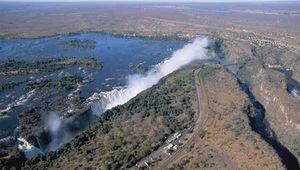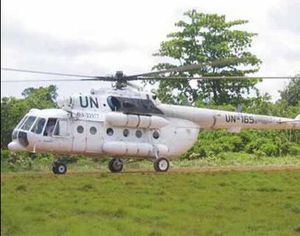Africa's renaissance for the environment: environment for peace and regional cooperation
Contents
Issues
Regional cooperation has been part of Africa’s strategy for economic transformation for more than three decades – and in some cases almost a century. African countries continue to “build upon a rich history of bilateral and multilateral water treaties, spanning nearly 1,200 years across the world” (Giordano and Wolf 2003). More than 3,600 treaties relating to international water resources, dating back to AD 805 have been identified, and about 300 treaties negotiated since 1814 deal with water specifically as a limited consumable resource. In Southern Africa, for example, an Anglo-Portuguese Convention on the Zambezi River was signed in Lisbon in 1891 and covered the main river and its tributaries. These and other agreements on water resources laid the foundation for regional cooperation in conflict resolution and environmental management in Africa.
The body of regional policies, and bilateral and multilateral environmental agreements (MEAs) has grown over the decades, and now include the management of transboundary national parks, large marine ecosystems, forest resources, and mountain ranges as well as hydropower generation and oil exploitation. Regional cooperation now also extends to trade and economic sectors such as tourism.
Despite these successes, regional integration has a long way to go in achieving concrete results in terms of accelerating growth and promoting regional trade. A recent assessment by the Economic Commission for Africa (ECA) pointed to a number of constraints including:
- Multiple and overlapping membership;
- Reluctance by member states to adhere to integration programmes;
- Insufficient technical and analytical support;
- Divergent and unstable national macro-economic policies;
- Inadequate capacity and resources to spearhead the integration process;
- Lack of coherence and links among sectoral cooperation programmes and the macro-economic policies pursued by regional economic communities;
- Missing or ineffective mechanisms for organizing, implementing, controlling, monitoring and revising the integration process;
- Lack of national mechanisms to coordinate, implement, and monitor integration policies and programmes; and
- Inability to make integration objectives, plans and programmes part of national development framework.
There have been some important developments related to cooperation in the management of transboundary freshwater resources. The Southern African Development Community (SADC), which has the most advanced water sector integration among the regional communities, is the only regional economic community (REC) with a special protocol for addressing water issues. While recognizing that SADC has a way to go, especially in harmonizing national water laws and policies, the ECA opines that SADC’s protocol “shows that members are committed to integrated water management” making SADC “a model for cooperation between river basin organizations and regional economic communities across Africa” (ECA 2004).
Despite these and other cooperative activities, Africa has also experienced many major armed conflicts, which have left millions dead, hundreds of millions displaced in their own countries or forced to flee across national borders, and the environment has been seriously threatened. In 2003, for example, Africa had the largest number of refugees: of the more than 9.7 million refugees reported worldwide, about 2.9 million were Africans. About half of the world’s refugees were female (49 percent), and in Africa, more than half of the refugees were under 18 years. Conflict impacts upon people in multiple ways; it especially threatens human security. Human security, is more than just freedom from fear and the threat of physical harm, it is also about having sufficient capabilities – such as access to material goods (including natural resources on which many livelihoods are based), good health, adequate education etc which are the foundation of opportunities – to lead a good and fulfilling life. Conflict has impacts at all these levels, and detracts from the opportunities people have as well as their quality of life. Many people face starvation as a direct result of conflict, and women and girls face the risk of rape and kidnapping. Conflict destroys social and political networks, consequently increasing the incidence of social exclusion.
Settlements of refugees and internally displaced persons (IDPs), especially in the GLR and Western Africa, present special challenges for achieving environmental and human well-being goals. Virtually all of these settlements were not planned to support the numbers of people which now inhabit them. In many areas this has resulted in a high level of environmental vulnerability. For example, refugee settlements alongside the Virunga National Park in the Democratic Republic of Congo (DRC) placed considerable strain on its resources. Such settlements may also have undesirable impacts on the host communities and resource use by the host communities.
Armed conflict is a serious threat to regional priorities in focusing on the opportunities which are provided by the environment for sustainable development. It also contributes to the diversion of scarce resources to the war effort, the breakdown of environmental management systems, and overexploitation of natural resources to fund wars. Recent actions by the AU, ECOWAS and the Inter-Governmental Authority on Development (IGAD) to foster peace and security in the region are, however, commendable.
Outlook
In Africa a combination of historical, internal and external factors converge to exacerbate conflict. Internal factors include patterns of governance, poverty and competition over resources. Unless Africa invests in conflict avoidance and peace-building efforts, by improving governance, addressing poverty and increasing cooperation, conflicts are likely to increase. And because there is a direct correlation between social conflict and environmental degradation this will increase the negative impact on the environment, which in turn has economic and social implications. The World Bank, for example, estimates that conflict in Africa results in an annual loss of 2 percent economic growth.
Africa has adopted a number of instruments which facilitate regional cooperation, including the Constitutive Act of the African Union (AU), which among other objectives, promote peace, security and stability as a prerequisite for the implementation of the region’s development and integration agenda. Protocols of sub-regional economic groupings also highlight the need for regional integration and development. These arrangements will continue to be strengthened in the years ahead across areas critical to sustainable development. Such developments can only provide an atmosphere for the region to exploit the opportunities available, particularly in terms of the environment.
Given that, at the national level efforts to avoid and resolve conflict are also important. Moves towards greater democratization, and more transparent and equitable systems for sharing of benefits from natural resource use is important. Increased stakeholder participation is also key to enhancing the opportunities for peace.
Action
While Africa has many examples of successful regional cooperation and conflict management, more needs to be done to focus on the opportunities for cooperation and conflict reduction. Below are some of the areas which require attention and action:
- Implement realistic measures which address poverty. Research has shown a strong causal impact of poverty on the onset of conflict. Poverty creates the conditions for igniting and sustaining conflict.
- Adopt the environment as one of the key areas to be included in the NEPAD peer review mechanism. At present, the environment is not one of the criteria used to review the performance of each other’s governments.
- Designate urban areas and human settlements as one of the programme areas of the New Partnership for Africa's Development - Environmental Action Plan (NEPAD-EAP). Settlements of refugees and IDP could be an important focus.
- Rationalize the multiplicity of sub-regional and regional organizations with competing environmental mandates and interests, ensuring synergy among them, and the ways in which they all feed into decision-making processes of the AU.
- Negotiate, collectively through the AU, across different sectors and issues, including foreign aid, technology and trade in order to meet the challenges of sustainable development.
- Lobby for the AU Constitutive Act, particularly its conflict management provisions, to be applied in trying to resolve disputes over natural resource use or access.
- Recognize the crucial role that regional economic communities, such as IGAD, ECOWAS, and SADC, have played in promoting peace and sub-regional cooperation. And, in support of this, further strengthen these organizations and encourage the sharing of best practice between them.
Stakeholders
All governments and institutions, the private sector, civil society, universities and the public have a stake in ensuring that regional cooperation is a major consideration in their activities.
Result and target date
Regional cooperation, conflict management and peace build investor confidence and encourage investment. The UN Millennium Project (2005) has reported that investing in development is important to reduce the probability of conflict. Regional cooperation is not automatic nor is it a given; it needs commitment and action – from governments right down to the public. The main target for cooperation should be the AU, and through its institutions the implementation of programmes to support sustainable development and achieve the Millennium Development Goal (MDG) targets.
Further reading
- AU, 2000. Constitutive Act of the African Union .African Union, Lome.
- Chenje, M., 2003. Hydro-politics and the quest of the Zambezi River-Basin Organization. In International Waters in Southern Africa (ed. Nakayama, M.). UNU Series on Water Resources Management and Policy. United Nations University Press, Tokyo.
- ECA, 2004. Assessing Regional Integration in Africa. ECA Policy Research Report. Economic Commission for Africa.
- DfID, 2001. The causes of conflict in Africa. Department for International Development, London.
- Giordano, M.A. and Wolf, A.T., 2003.Transboundary Freshwater Treaties. In International Waters in Southern Africa (ed. Nakayama, M.), pp. 71-100. UNU Series on Water Resources Management and Policy. United Nations University Press, Tokyo.
- MA, 2006. Ecosystems and Human Well-being: Current State and Trends. Volume 1. Millennium Ecosystem Assessment. Island Press, Washington D. C.
- OSAA, 2005a. Human Security in Africa. United Nations Office of the Special Adviser on Africa, New York.
- UN, 2004. A More Secure World: Our Shared Responsibility. Report of the High-level Panel on Threats, Challenges and Change. United Nations, New York.
- UNEP, 2006. Africa Environment Outlook 2. Nairobi, Kenya.
- UNHCR, 2004. 2003 Global Refugee Trends. United Nations High Commissioner for Refugees, Geneva.
- UN Millennium Project, 2005a. Investing in Development – A Practical Plan to Achieve the Millennium Development Goals. Earthscan,New York.
|
|
| Disclaimer: This article is taken wholly from, or contains information that was originally published by, the United Nations Environment Programme. Topic editors and authors for the Encyclopedia of Earth may have edited its content or added new information. The use of information from the United Nations Environment Programme should not be construed as support for or endorsement by that organization for any new information added by EoE personnel, or for any editing of the original content. |


